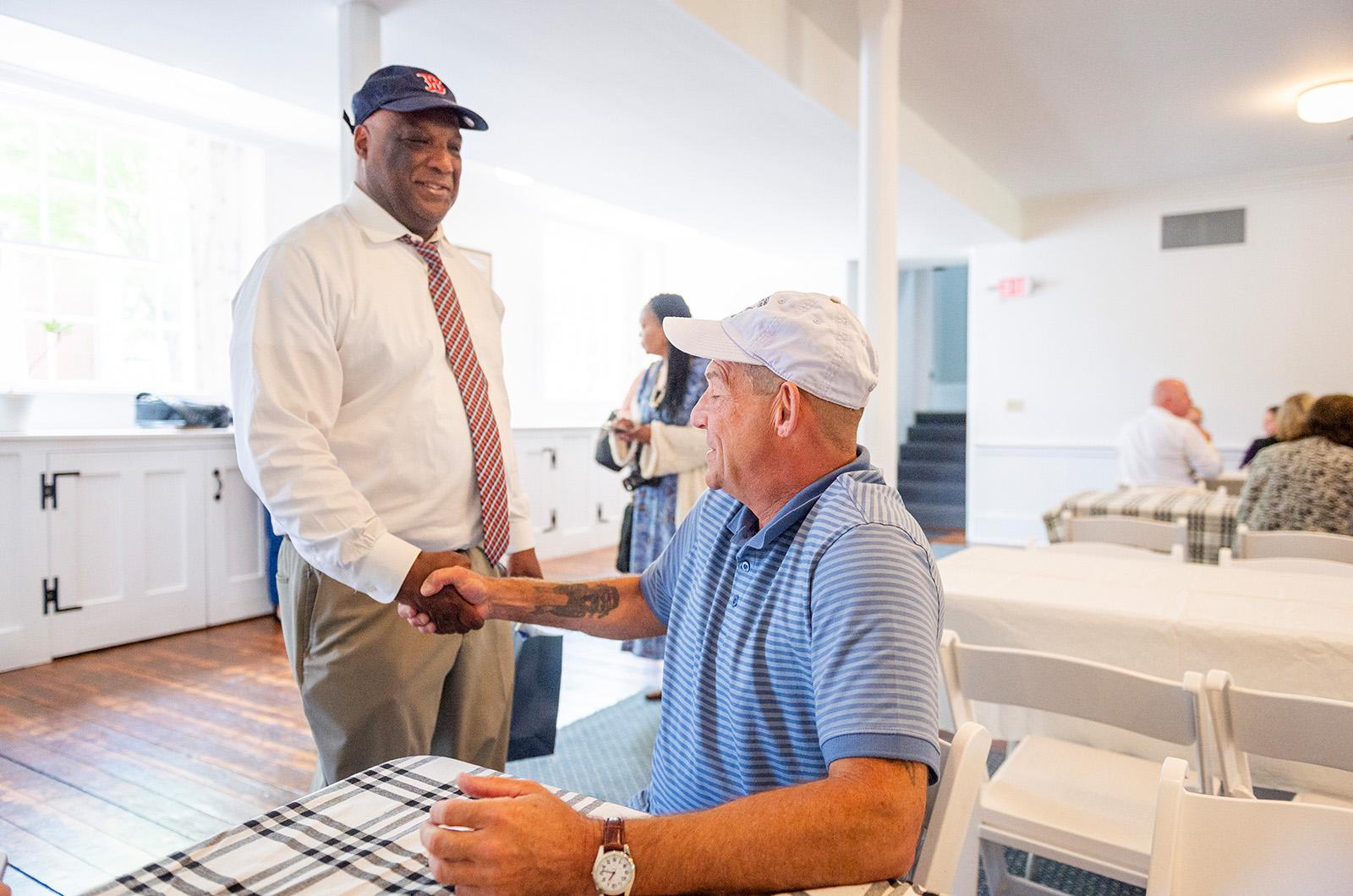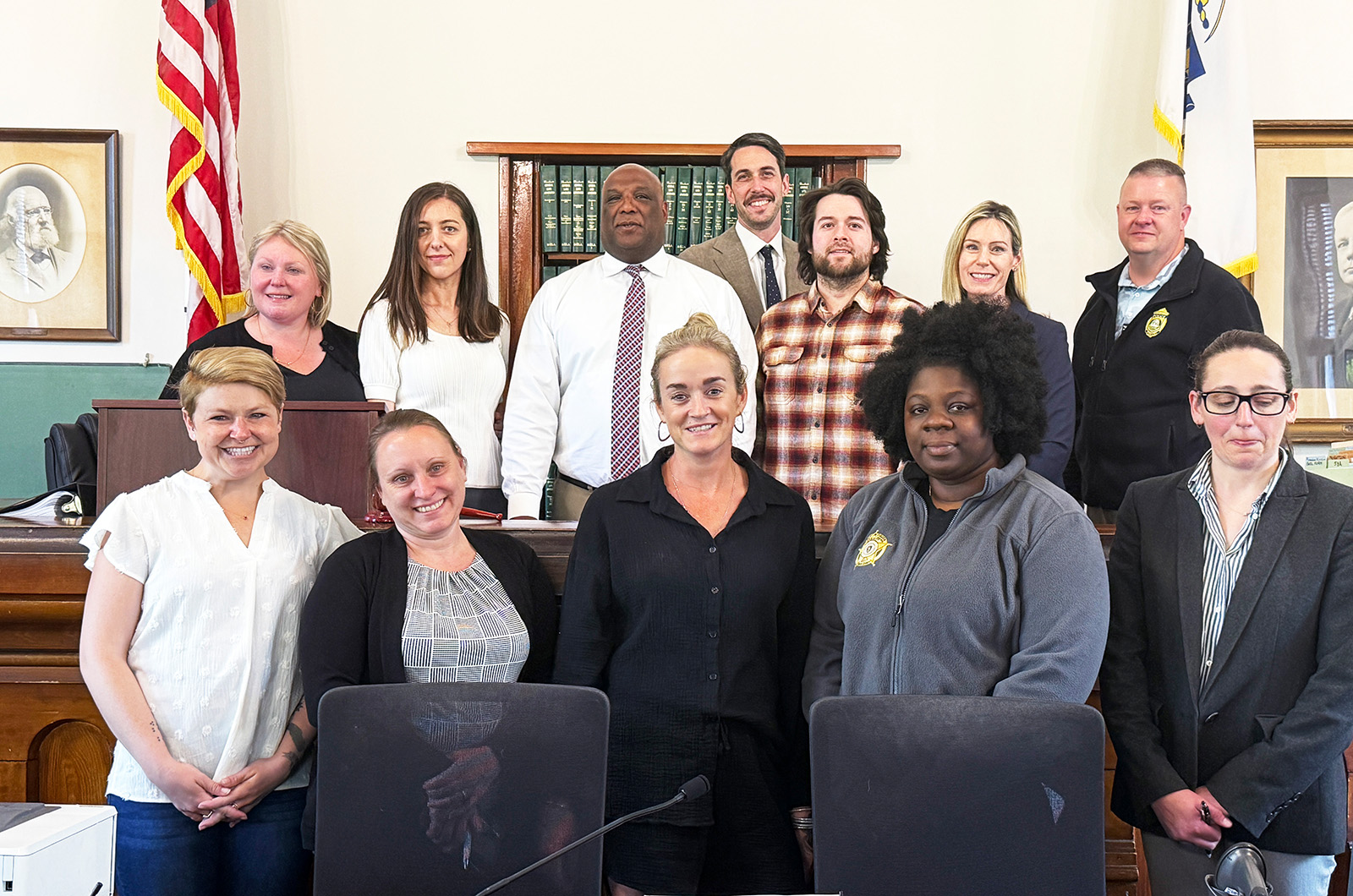The Edgartown District Court room was bedecked with purple balloons and flowers on Wednesday, displaying an unusually cheerful scene.
Four people sat before the bench – the first class of the Island’s new recovery court about to graduate and complete probation. The court started in 2024 and aims to address the underlying addiction that often drives people repeatedly into the criminal justice system.
Sean McGrath was one of the graduates. He said he’s been in-and-out of the court, and it was a full-circle moment to be there celebrating a new beginning.
“I don’t know how to say it in words,” Mr. McGrath expressed. “I’m just humbled, and I’m feeling blessed today that I’ve had this resource to keep [me] going in the right direction.”
Participants in the court had been going to the courthouse every Wednesday for 18 months, rising through several levels, and in some cases going to inpatient treatment, detox and counseling. The Island’s court is one of 34 recovery courts in the state and participation is voluntary.
Sheila Casey, the director of the state specialty courts department, said the recovery court is a needed resource to encourage people who struggle with addiction to stay out of court and get healthy through positive reinforcement.
“We’re dealing with a disease that a lot of medical professionals define addiction as continued use despite adverse consequences,” Ms. Casey said. “In the court system, we’re really good at adverse consequences.”
Liza Williamson, Edgartown clerk magistrate, said she feels as if the recovery court spurred an evolution in the court.
“You really can’t punish away some things…” Ms. Williamson said. “We’re becoming a true community court where we can be a resource in order to provide healthy support for our community.”
The recovery court is a team effort run by Martha’s Vineyard Community Services, Island Health Care, Gosnold Behavioral Health, the court probation department, the district attorney’s office and defense attorneys.
Judge Benjamin C. Barnes said he was, at first, opposed to starting a recovery court on the Island. He had previous experience off-Island and said it was emotionally taxing when participants would relapse.
But at the graduation ceremony, Mr. Barnes’ smile beamed as he told graduates and their families they proved him wrong. He encouraged graduates to live their lives to the fullest.
“We want you to think big and we want you to represent us,” Mr. Barnes said. Alyse Demary, chief probation officer, told the graduates that there could be moments when they feel alone after they leave the recovery program. But she said they will always have the Island community to fall back on.
“In the blink of an eye, you can be caught-up in a rip current – swept away from land to where you can no longer see [it]...” Ms. Demary said. “But I want you to remember that today is your tether. You are tethered to the margins in your community.”
Katie O’Leary, the director of recovery services at North Suffolk Community Services, gave the keynote address at the graduation. Ms. O’Leary struggled with addiction and had run-ins with the law.
After reaching a breaking point, she entered treatment. She said it was a long and emotional journey, but due to the kindness of others, she found peace in a new, sober beginning.
“This is not a race,” Ms. O’Leary told the graduates. “There is no finish line…. So take your time, be nice [and] be gracious with yourself.”
Dukes County Sheriff Bob Ogden, Island Police chiefs Chris Dolby, Jonathan Searle and Sean Slavin and Tisbury Lieut. Bill Brigham applauded the graduates who gave speeches sharing how they feel a responsibility to live the rest of their lives sober, and as an example of the court’s success.
State Rep. Thomas Moakley said he was an assistant defense attorney when the court first discussed starting the recovery court.
“What really drew me to the recovery court program from the very beginning is that it’s such a great representation of how this Island looks out for one another,” Mr. Moakley said. “This is a perfect example of how we don’t have to do things the way they’ve always been done…”
Others still in the recovery court watched their peers approach the bench and shake Judge Barnes’ hand. The judge told them they’ll soon be graduating if they keep working.
Jessica Haggerty, Edgartown court’s assistant chief of probation who worked directly with each of the graduates, expressed her pride in the graduates.
“You guys made a choice to have a fresh start, you made a choice to come here,” Ms. Haggerty said to the graduates.
She gave each of them a pot filled with an offshoot of an oak leaf hydrangea, representing a new beginning. She said the tree has been in her family for over 150 years, and gets handed down to every generation.
At a reception in the Old Whaling Church following the ceremony, Mr. McGrath told the Gazette he had been previously been sentenced for five years. When he was released, he came to the Island in the thick of the Covid-19 pandemic, and his addiction grew.
He said addiction can be more prevalent on the Island due to the isolation, but there are many resources to help. He had a message for people at a low point with their addiction.
“You don’t have to wait until you get into trouble,” Mr. McGrath said. “If you need help, every one of those people in that building would point you in the right direction.”









Comments (2)
Comments
Comment policy »